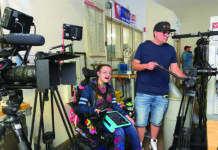A non-profit organization, Club 20, hosted live political debates in Robinson Theatre for local candidates whose election will directly affect the Western Slope.
This included House Districts 13, 26, 54, 55, 57, 58 and 59, as well as Senate Districts seven and eight. Other debates included the Colorado Secretary of State, State Treasurer, Attorney General, Senator, Governor and the Second and Third Congressional Districts. The Sept. 10 event ran from 8 a.m. until 8:15 p.m.
The highlight of the day was the debate between Lauren Boebert and Adam Frisch for the House of Representatives seat for the third district.
“I’ve never been to a professional debate until then, so it was interesting to see how it all worked and it gave me a better and more personal idea of our district candidates,” senior in Political Science Trevor Cook said. “In my opinion, Frisch won the debate, though I still think he left out a few important details. I feel as though Boebert spent too much time speaking on issues that are out of her constituent’s [interests].”
Cook went into the debate knowing who he was going to vote for, but felt that it solidified his decision.
Within the first few minutes of introducing the rules, Boebert interrupted the moderator to express that it could be an unfair debate because the moderator was allegedly an outspoken Democrat. Despite the opposition early on, the debate continued and each candidate was able to answer six questions.
Questions were heavily focused on the climate crisis and infrastructure fixes on the Western Slope. Both candidates agreed that climate change needs to be addressed, but had different fixes.
Boebert stated that we need to be stewards of the environment and that nuclear energy is the answer for the future. Frisch refuted that other forms of energy such as wind, sun and water were going to be more effective, as well as implementations like the carbon tax.
Junior Political Science major, Taylor Russell, attended the debate as well. He stated that it seemed childish because the candidates went off-topic and used personal, or ad hominem, attacks. He went on to say that he felt Frisch was a “controlled opposition” without further elaboration.
“I don’t think it’s about who won. I think it’s about the loss, and it was clear that Adam Frisch lost because he has to really show up to beat the incumbent. He did not accomplish that, in my mind,” Russell said.
Russell encourages students to attend school events such as this, especially because voters need to know who the candidates are in a democracy.
One of Boebert’s key talking points was that Nancy Pelosi is running a con game and that she plans to personally stop it. Boebert claimed that 22 hours before a legislative session, she would receive 2,000 pages of legislation, intended to trick members of Congress to vote for hidden agendas.
In response, Frisch stated over and over, “I am not Nancy Pelosi, I am Adam Frisch.” He continued to say that he would not be going with any party’s agendas, and would vote on, and support, legislation that will solely benefit the citizens of the Third Congressional District.
Both candidates had a hard time answering certain questions. For example, Frisch had a difficult time replying to Boebert’s questions about why he pushed back a housing bill; her claim is that it was to benefit himself and his $9 million home in Aspen.
Similarly, Boebert could not directly answer why she had voted against certain bills that she claimed to have helped pass in a news release.
Though questions were hurled like weapons in the debate, each candidate stayed calm and kept to their time limits without interrupting each other–though, the candidates did talk over one another during cross-questioning. The event ended with the candidates shaking hands with each other, the panelists and the moderator.
“I would recommend everyone, even those who are not students, to attend these types of events–especially for congressional candidates of their district. It’s very common for people to complain about politics and politicians, However [it is] uncommon for citizens to actually engage and participate in crucial events, such as debates, that allow you to further your knowledge of how each candidate handles things on the fly,” Cook said.




